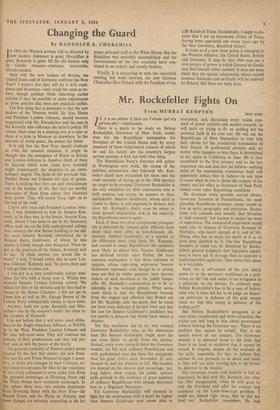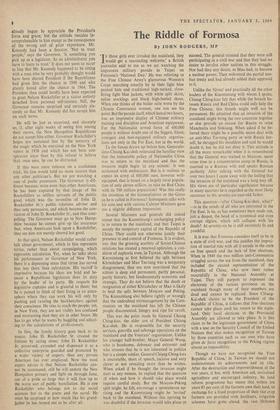Mr. Rockefeller Fights On
From MURRAY KEMPTON
NEW YORK
`Lya un poente a faire sur l'oiseau qui n'a I qu'une There is a poem to be made on Nelson Rockefeller, Governor of New York, candi- date for the Republican nomination for President of the United States and, by every standard of those behavioural sciences of which he and his family are his country's largest private patrons, a bird but with what wing.
The Republican Party's directors will gather in Washington next week, the excuse of the political moratorium that followed Mr. Ken- nedy's death now exhausted for them and the cruel necessity of facing up to the 1964 election no longer to be avoided. Governor Rockefeller is the only candidate for their nomination who is both anxious and active; he appears to them unthinkable. Senator Goldwater, whose spirit is closest to theirs, is still expected, to declare; but, since Mr. Kennedy's death, even he seems to think himself implausible, and, in the majority, the Republicans seem to agree.
Each of these two most conspicuous protagon- ists is debarred for reasons quite different from those cited most often in post-Kennedy dis- cussions. Senator Goldwater, as a symbol of the difference most total from Mr. Kennedy, had seemed to many Republicans the candidate most likely to defeat him. Senator Goldwater has declined terribly since Dallas; the most common explanation is that those extremes of opinion, whose right-wing expression Senator Goldwater represents even though he so plainly does not feel its wilder passions, have become objects of such revulsion to the public temper after Mr. Kennedy's assassination as to be in- tolerable in the national debate. What seems more likely is that the Republicans learned, from the respect and affection that flowed out for Mr. Kennedy after his death, that he could not have been defeated if he had lived and that the case for Senator Goldwater's candidacy was not merely a delusion but would have meant a disaster.
Yet this revelation has in no way assisted Governor Rockefeller who, as the alternative least like Senator Goldwater, might seem the one most likely to profit from his decline. Instead, every event seems to leave the Governor weaker; his fall with ordinary Republicans and with professional ones has been less precipitate than his great rival's since November 22 only because he had less distance to fall. His troubles are blamed on his divorce and remarriage; but, long before these events, the public opinion polls pointed to the existence of great numbers of ordinary Republicans who already distrusted him as a disguised. Democrat.
Yet Governor Rockefeller will proceed to fight for the nomination with a heart far higher than Senator Goldwater now seems able to command, and, dismissing every visible stan- dard of power analysis and market research, he will insist on trying to fly on nothing but his personal faith in his own star. He will ask the Republicans of New Hampshire to vote him their choice for the presidential nomination in their March 10 preferential primary and, no matter what happens to him there, is determined to try again in California in June. He is thus committed to the first primary and to the last important one and does not yet believe—nothing short of the nominating convention itself will apparently induce him to believe—in any time to come when he has to throw the majesty of his means and his office as Governor of New York behind some other Republican candidate.
He dismisses every possible second choice. Governor Scranton of Pennsylvania, the most plausible Republican nominee, seems closest to him in spirit, geography and enterprise. Rocke- feller will concede and warmly that Scranton is 'well oriented,' but hastens to notice his want of experience. The standard of experience would seem also to dispose of Governor Romney of Michigan, who hasn't enough of it, and of Mr. Nixon, who has so much too much of it as to have been disabled by it. The few Republican Senators at hand can be dismissed by Rocke- feller's general judgment that legislative experi- ence is more apt to damage than to improve a man's executive capacities. That leaves him alone as a candidate.
Now this is self-esteem of the sort which seems to us the necessary confidence in a poli- tician on the 'rise and seems to us arrogance in a politician on the decline. To ordinary men, Nelson Rockefeller's has to be a case of hubris; what way is there left for us to judge an Ameri- can politician in defiance of the gods except when we find him acting in defiance of the Gallup poll?
But Nelson Rockefeller's arrogance is at once more complicated and more attractive. No visitor can talk long to him about government Without hearing the Governor say: 'There is no problem that cannot be solved.' That is the special hubris of our century. The Governor extends it in personal terms to the faith that there is no head so stubborn that it cannot be turned. It remains, despite all the evidence of the polls, impossible for him to believe that anyone he can persuade to sit down and listen to him will not arise trusting him as he knows he deserves to be trusted.
The Governor recalls with surprise in fact an experienc6 he had with Mr. Kennedy just after the 1961 inauguration, when he had gone to visit the President and offer his counsel and assistance on the Latin-American problem. could see, almost right away, that he did not trust me,' Rockefeller remembers. He had already begun Jo appreciate the President's force and grace; but the attitude remains in- comprehensible to him except as the consequence of the wrong sort of prior experience. Mr. Kennedy had been a Senator. 'Not to trust people,' says the Governor, 'is something you pick up as a legislator. As an administrator you have to learn to trust.' It does not seem to occur to him that Mr. Kennedy happened to be sitting with a man who he very probably thought would have been elected President if the Republicans had given him the chance in 1960 and who plainly lusted after the chance in 1964. The President then could hardly have been expected to greet Nelson Rockefeller as a visitor entirely detached from personal self-interest. Still, the Governor remains surprised and certainly sin- cerely so that Mr. Kennedy did not accept him on such terms.
. He will be just. as surprised, and sincerely so, if, after eight weeks of seeing him among their snows, the New Hampshire Republicans do not accept him either. Governor Rockefeller's hopes are sustained less by the memory of the magic which he exercised on the New York voters in 1958 and which has not been con- spicuous since than by this refusal to believe that, once seen, he can be distrusted.
If this were mere reliance on a confidence trick, his fate would hold no more interest than any other politician's. But we are watching a case of poetic possession. The Governor is dif- ferent because, more even than other Americans, he has been captured by that image of the Rockefellers as selfless servants of the public good which was the invention of John D. Rockefeller Sr.'s public relations adviser and thus only persuasive, and which became the con- viction of John D. Rockefeller Jr., and thus com- pelling. The Governor must go to, New Hamp- shire because he cannot give up the assurance that, when Americans look upon a Rockefeller, they see him not merely shrewd but good.
In that spirit, Nelson Rockefeller would rather talk about government, which to him represents virtue, rather than about campaigning, which represents calculation. Yet, when he talks about his performance as Governor of New York, there is a depressing sense that virtue has served him less there than calculation. His record is impressive because his ideas are bold and be- cause a Republican legislature does its duty by the leader of its party. He respects his legislative captains and is grateful to them; but he is pained to think of their living in an atmo- sphere where they can work his will only by pushing and twisting the backbenchers against their conscience. He tries to reach the people; yet, in New York, they are not visibly less confused and mistrusting than they are in other States. He has to get what he wants by haggling and adjust- ing to the calculations of professionals.
In him, the family history goes back to its source. John D. Rockefeller Sr. created the fortune by acting alone; John D. Rockefeller Jr. preserved, extended and dispensed it as a collective enterprise guarded and protected by a wider variety of experts than any private American has ever employed. Now the most expert advice is that Nelson Rockefeller can- not be nominated; still he will endure the New Hampshire primary and fight on through June, out of a pride so large that it will face up to the worst sort of public humiliation. He is one Rockefeller who belongs not to the social sciences but to the poem and the novel. He must be surprised at how much like his grand- father he has turned out to be after all.































 Previous page
Previous page